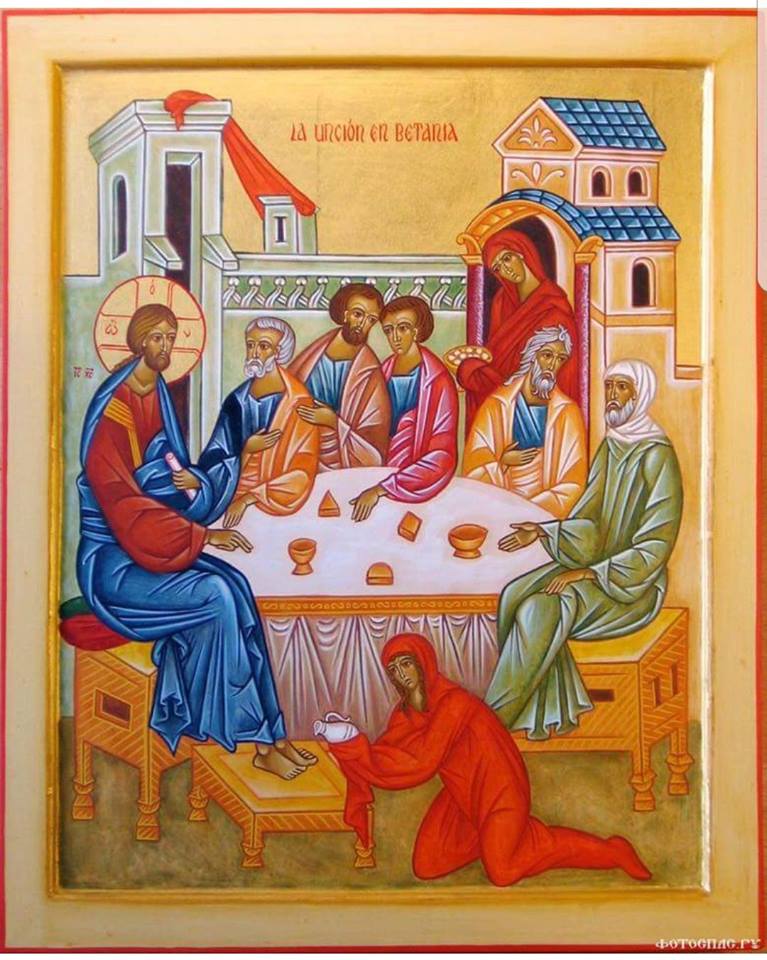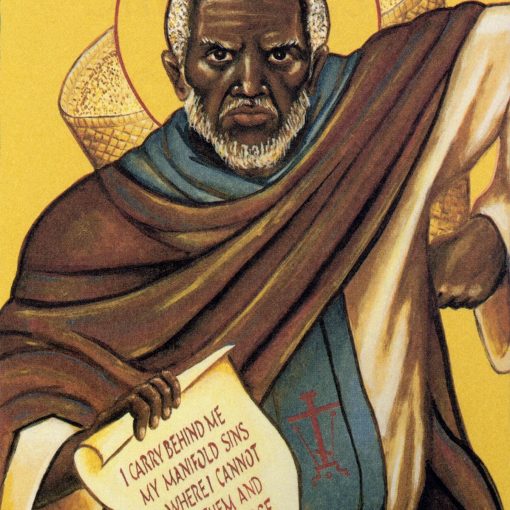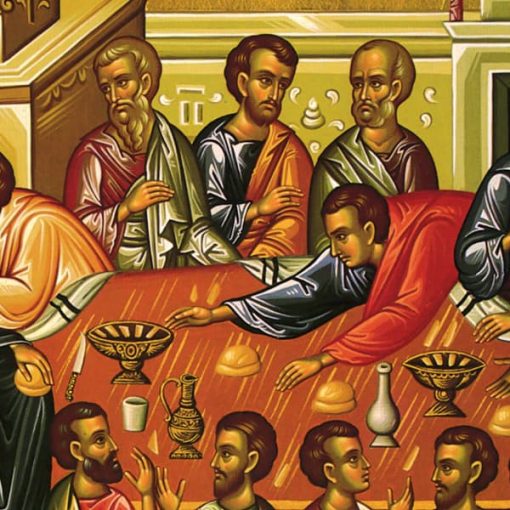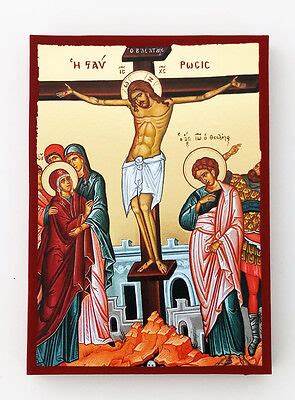Troparion — Tone 8
Behold the Bridegroom comes at midnight, / and blessed is the servant whom He shall find watching, / and again unworthy is the servant whom He shall find heedless. / Beware, therefore, O my soul, do not be weighed down with sleep, / lest you be given up to death and lest you be shut out of the Kingdom. / But rouse yourself crying: Holy, Holy, Holy, are You, O our God! / Through the Theotokos have mercy on us!
Reading from the Book of Exodus 2:11-22
Now it came to pass in those days, when Moses was grown, that he went out to his brethren and looked at their burdens. And he saw an Egyptian beating a Hebrew, one of his brethren.
So he looked this way and that way, and when he saw no one, he killed the Egyptian and hid him in the sand.
And when he went out the second day, behold, two Hebrew men were fighting, and he said to the one who did the wrong, “Why are you striking your companion?”
Then he said, “Who made you a prince and a judge over us? Do you intend to kill me as you killed the Egyptian?” So Moses feared and said, “Surely this thing is known!”
When Pharaoh heard of this matter, he sought to kill Moses. But Moses fled from the face of Pharaoh and dwelt in the land of Midian; and he sat down by a well.
Now the priest of Midian had seven daughters. And they came and drew water, and they filled the troughs to water their father’s flock.
Then the shepherds came and drove them away; but Moses stood up and helped them, and watered their flock.
When they came to Reuel their father, he said, “How is it that you have come so soon today?”
And they said, “An Egyptian delivered us from the hand of the shepherds, and he also drew enough water for us and watered the flock.”
So he said to his daughters, “And where is he? Why is it that you have left the man? Call him, that he may eat bread.”
Then Moses was content to live with the man, and he gave Zipporah his daughter to Moses.
And she bore him a son. He called his name Gershom, for he said, “I have been a stranger in a foreign land.”
Reading from the Book of Job 2:1-10
Again there was a day when the sons of God came to present themselves before the Lord, and Satan came also among them to present himself before the Lord.
And the Lord said to Satan, “From where do you come?” So Satan answered the Lord and said, “From going to and fro on the earth, and from walking back and forth on it.”
Then the Lord said to Satan, “Have you considered My servant Job, that there is none like him on the earth, a blameless and upright man, one who fears God and shuns evil? And still he holds fast to his integrity, although you incited Me against him, to destroy him without cause.”
So Satan answered the Lord and said, “Skin for skin! Yes, all that a man has he will give for his life.
“But stretch out Your hand now, and touch his bone and his flesh, and he will surely curse You to Your face!”
And the Lord said to Satan, “Behold, he is in your hand, but spare his life.”
So Satan went out from the presence of the Lord, and struck Job with painful boils from the sole of his foot to the crown of his head.
And he took for himself a potsherd with which to scrape himself while he sat in the midst of the ashes.
Then his wife said to him, “Do you still hold fast to your integrity? Curse God and die!”
But he said to her, “You speak as one of the foolish women speaks. Shall we indeed accept good from God, and shall we not accept adversity?” In all this Job did not sin with his lips.
Gospel of Matthew 26:6-16
And when Jesus was in Bethany at the house of Simon the leper,
a woman came to Him having an alabaster flask of very costly fragrant oil, and she poured it on His head as He sat at the table.
But when His disciples saw it, they were indignant, saying, “Why this waste?
For this fragrant oil might have been sold for much and given to the poor.”
But when Jesus was aware of it, He said to them, “Why do you trouble the woman? For she has done a good work for Me.
For you have the poor with you always, but Me you do not have always.
For in pouring this fragrant oil on My body, she did it for My burial.
Assuredly, I say to you, wherever this gospel is preached in the whole world, what this woman has done will also be told as a memorial to her.”
Then one of the twelve, called Judas Iscariot, went to the chief priests
and said, “What are you willing to give me if I deliver Him to you?” And they counted out to him thirty pieces of silver.
So from that time he sought opportunity to betray Him.
Homily
It is in today’s reading we first hear of the betrayal of Jesus by Judas. One of the worst things that can happen to us is to be betrayed by someone who is very close to us and with whom we have shared our time, our trust, and our love. For example, we claim that we are victims of betrayal like a betrayal by a husband, a wife, a family member, a friend, a co-worker, and so on and so forth. It is said that betrayal is one of the worst crimes one could ever commit. It strikes us as our deepest selves. We feel alienation and loneliness. However, an experience of betrayal may offer an opportunity for a deeper commitment to God and a trusting relationship with one another purified and motivated by love.
Many Bible commentaries said that Judas had three possible reasons why he betrays Jesus. First, maybe due to avarice, or he is motivated by greed. If you can still remember last Holy Monday’s gospel where Jesus visited Martha, Mary, and Lazarus and where Mary, to show her gratitude to Jesus, washed His feet and poured His head with her expensive perfume? Judas protested against that act. He said that if this “wasted” perfume were sold, the money could be given to the poor. But in reality, Judas had no concern for the poor.
The second is due to his disappointment with the actions of Christ. He is disappointed or disillusioned or he thinks that Jesus is too slow and not so aggressive to set up His Messianic kingdom. Or he wants to use Jesus for his own purposes and that is, to have wealth and honor. But for him, Jesus cannot give this kind of wealth and honor because He would soon be crucified. Or Jesus’ behavior does not meet his expectations. He wants to change Jesus’ life and mission instead of him changing his own and following Jesus. The same is true with us. We are tempted to use God for our own purposes. Instead that we must be changed by Him, it is now God who must change.
Third, it may be that Judas never intended for Jesus to die. Actually, Judas came from a highly nationalistic family. And perhaps he joins Jesus in the hope of finding in Him a gifted national leader. His disillusionment is complete when Jesus refuses this role. But if Judas broadens and deepens this passion in order to be compatible with the Gospel, his nationalism transforms into something greater and he might become a great apostle of “the holy nation, the people set apart,” the new People of God. Just like the other disciples, he might become a “fisher of people.”
We can never truly know what motivated Judas, he very simply could have been just fulfilling a role in the passion bigger than he or others could possibly understand at the time or even now, all these many years later. Judas leaves us with the question of why when maybe our focus needs to be on what is next. How do we move on from betrayal.? Let us examine ourselves in the light of God’s truth and grace and ask Him to strengthen us in faith, hope, and love so that we may not fail Him or forsake Him when we are tempted. And let us ask ourselves: do we consider ourselves close friends of Christ? Or can we afford to betray Jesus as Judas did? It is because our love and life with Christ are something we must defend and cultivate. It should be immune from the cancer of pride and ego.





